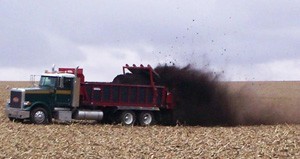
By Amy Millmier Schmidt, UNL Livestock Bioenvironmental Engineer
Remember when you couldn’t give manure away? Times have certainly changed. Given the continued trend of high fertilizer prices, manure continues to gain popularity as a fertilizer in cropping systems where it may have been overlooked previously.
Brokering manure between livestock and crop farms has become a fairly substantial component of the services provided by some consulting companies and custom manure haulers in the state. Aside from the desire to offset commercial fertilizer expenses by utilizing the nutrients present in manure, there are many reasons why crop producers should consider adding animal manure to their crop management plan.
“Soil health” is a term you may have heard thrown around in conversations quite a bit lately. This term, synonymous with soil quality, is used to describe the capacity of a soil to function as a living ecosystem that sustains plants, animals, and humans. The Natural Resources Conservation Service places considerable emphasis on the need to improve the health of soils calling this “one of the most important conservation endeavors of our time”. While both manure and inorganic fertilizers can provide nutrients to crops, manure has the added benefit of providing organic matter, microorganisms, micronutrients and minerals that are essential to “soil health”.
Incorporating manure into cropping systems where it has not been used on a regular basis can help improve quantity and diversity of soil invertebrates, increase microbial activity in the soil, and increase soil organic carbon. These soil characteristics play an important role in soil nutrient recycling and availability, organic matter quantity and quality, and many other important factors related to soil quality and function.
Research comparing crop performance under inorganic fertilizer versus organic fertilizer (manure) treatments has shown varied results. In some studies, plant heights and seed yields for corn were greater under poultry and cattle manure treatments than inorganic fertilizer treatments, while other studies concluded that no significant yield differences existed between these types of treatments. Other benefits recognized under manure treatments in published studies included reduced runoff, reduced losses of dissolved nutrients, and improved nutrient recovery.
If you are interested in marketing manure to neighboring crop producers, the conversation about the value of manure should include not only the value of the major nutrients in the manure, but also the added benefit manure provides for improving soil health. The Nebraska Extension Animal Manure Management Team offers further discussion of the value of manure and a Manure Value Calculator at http://extension.unl.edu/croppingwater/.
Nebraska State Conservationist Craig Derrickson has stated that “Healthy soils are the foundation of agriculture, and in Nebraska, agriculture is the foundation of our entire economy.” My recommendation to crop producers based on available research is to utilize a combination of manure and commercial fertilizers, as this is likely to produce optimal crop production and soil quality.